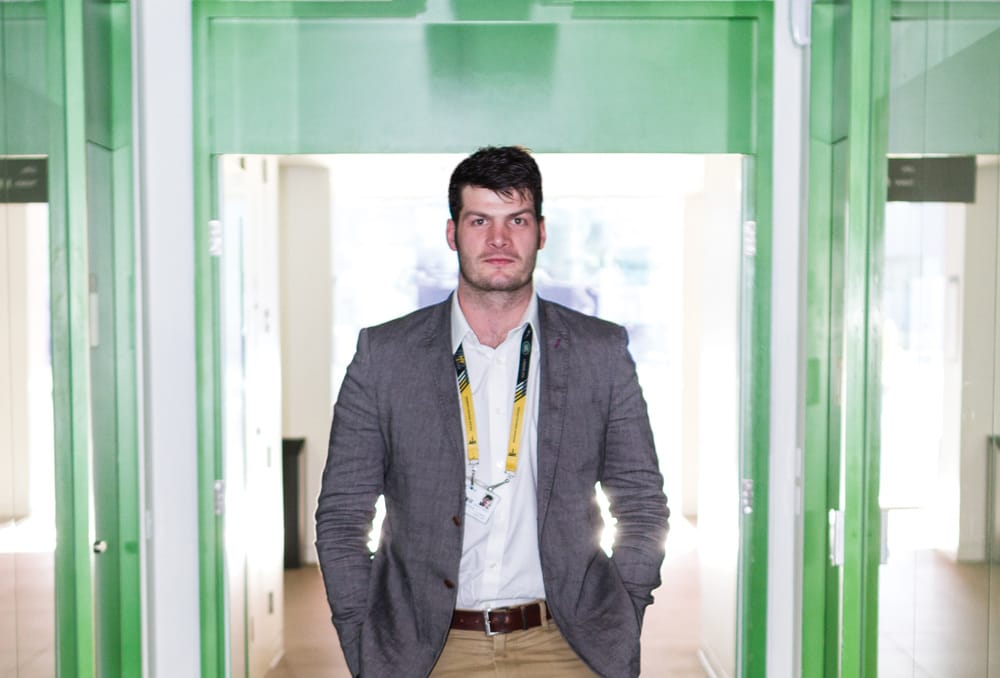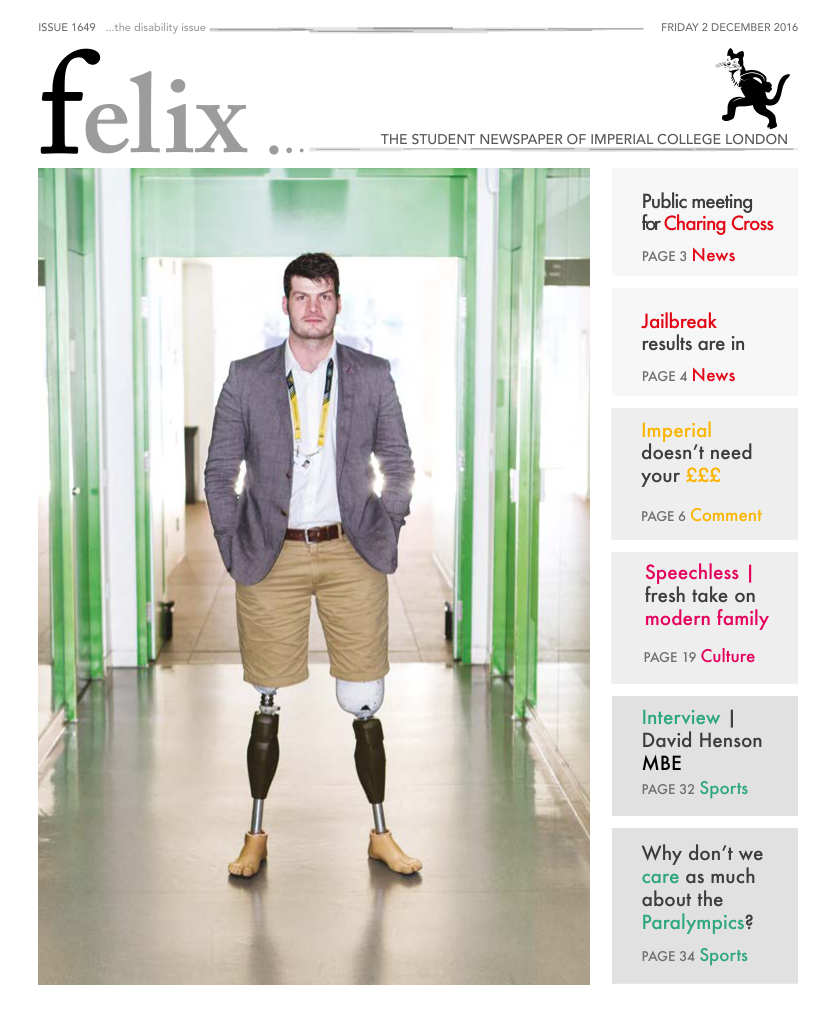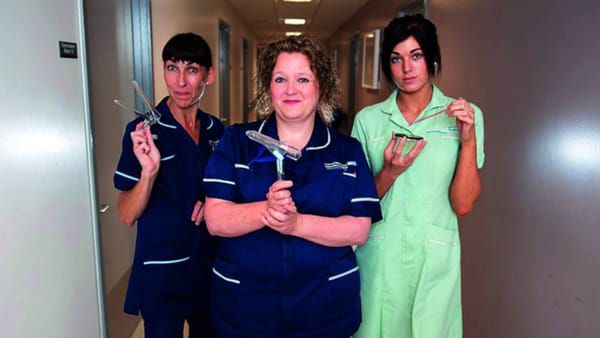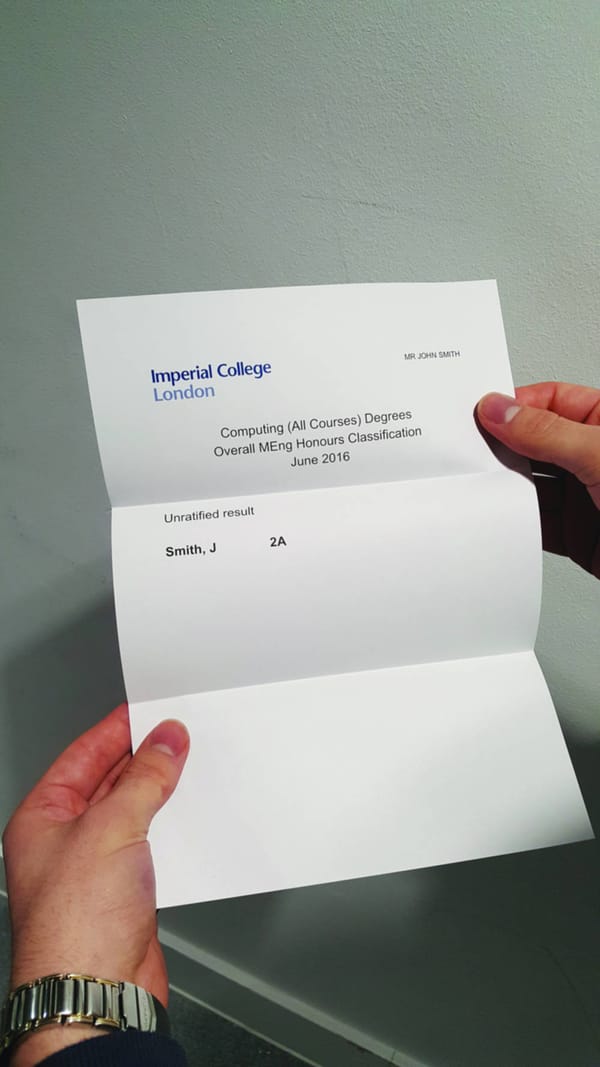Interview | David Henson MBE
Military veteran, bronze medallist PhD student

I struggle to get out of bed some mornings. OK, most mornings. OK, OK, I’m still in bed watching Jeremy Kyle yell at someone for having 3 wives and 1 kid whom they all swear is theirs, but we’ve gone off topic. Seeing as this is ‘disability week’ I figured I should talk to someone who knows enough about overcoming a disability to be awarded an MBE, win an athletics bronze medal and participate in research on their own prostheses. Talk about owning your disability (which we will actually do, later on)! Meet David Henson. He has agreed to play host to my first celebrity interview and talk about how he tackles playing multiple roles at once as well as re-adjusting to life as a bi-lateral amputee. Why is my lethargic attitude to an early morning relevant? Well read on and see why asking “What’s your excuse?” becomes painfully clear. How do you balance all the research, training and fame you’ve acquired since becoming both an academic researcher and Paralympic athlete? I think the balance is something that’s developed over time, so certainly when I started my PhD last year, the balance was too much in the favour of my PhD and my athletics and home life suffered. Then, as I got closer to the Paralympics, my academic and home life suffered as I put too much on athletics. I’ve just finished the 2015/16 athletics season and I’m just trying a new way of balancing all of the different activities I’ve got going on. With a bit more of a bias towards the academics. Even though I’m a part-time PhD student, I’d like to push on with my work; that’s where my career lies. As for athletics, while it’s a career now, it’s not going to last forever. It’s physically impossible to last forever. So, when I finish athletics, whenever that might be, I want my career to be in a good spot to take over. I actually find all the different elements to be complimentary to one another. As an amputee pushing into the high level sport that I’ve done, I’ve found weaknesses and limitations of my body, that take place on a day-to-day basis, are all amplified at speed. I think it’s easier to identify functional weaknesses in my body where I can improve and how that can translate from the track into everyday life and how it can inform my research. I think that it all works well, but definitely finding that balance and keeping supervisors happy is a difficult one, but I tend to make it work by getting up earlier. On a University day, I get up at 4:15 [am] and I’m in the office by 7:00 [am], sometimes earlier. I’ll try and a get a training session in either before work or during the day with the fabulous people in my department [I possibly count as one of these people due to the single time I went running with David]. A normal training session will be two hours on the track and an hour and a half to two hours in the gym and I’ll get those done back-to-back. In the morning, I’ll be on the track at 8:00am and I’ll have all my training sessions done by midday. Then I’ll have some lunch and I’ll be working from home in the afternoon. So it works out but it’s taken a long time to get right. You mention finding things out about your body. As you’re an amputee, do you find there’s a more personal than professional drive in your research looking at amputees? Definitely, one of the things I perhaps worried about at the start of the research was a bias but I think it’s OK. I’m coming at this from a bias point-of-view, it does provide a massive drive for me. I never really saw myself as an academic, I never thought I was clever enough to do that. Before I joined the army I was a mechanical engineer, then I joined and went through the officer route and as far as I was concerned that was my career. That’s what I was going to do and that’s what I was happy doing. All I ever really wanted to do was be an engineer in the army. When I lost my legs I was forced to reconsider my career route, I could have stayed in the army and flown a desk for a while which isn’t quite the same. I joined to be a professional soldier, to go on operations and that side of my life was taken away from me so it became non-viable. Looking back on previous qualifications and the situation I found myself in, with the prosthetics, I felt that I could use my own experiences to make things better for the amputee population. [I have] a distinct bias towards military amputees, as they’re essentially my extended family – a group I personally care about on an intimate level – so I came back to Imperial to do a Masters in engineering and more research into kinds of engineering systems that can be developed for interaction with the human body. From the masters I felt I didn’t know enough still, so I wanted to carry on to a PhD so I knew enough about my own body and my own situation to try and contribute towards solving the problem, rather than waiting for someone else to solve it for me. Qualifications aside, it’s been so beneficial to me from a psychological point of view. There are strong links between service men and women coming out of that service environment, and the lack of contribution you once felt as part of the army, and depression and mental health problems and I feel that switching straight into academia and contributing in a different way has kept my mental health at a stable and positive level. With a focus on Imperial College, does access to the College or the ability to move around campus hamper you at all? How would you rate the facilities we have here? For a central London based institution, it could be a lot worse. We are limited by real-estate, everything has to go up. So there are lifts and there are old buildings linked into new buildings, so it’s a very difficult map to negotiate. I get a parking permit and there are lifts everywhere, sometimes there are issues with the access facilities being maintained properly. The lifts can be broken which causes a number of problems. [The lifts] are few and far between so there’s a fair amount of walking but actually the college has gone out of their way to make sure everything they can do is done to a reasonable standard. There are a limited number of toilet facilities and sometimes the disabled facilities are either broken or occupied and that makes things difficult for someone with a disability. I don’t feel like it hampers me unless things have gone wrong. There have been times when a lift has been out of order and has been for a long time, which massively affects how far I have to walk. If I have to walk further, then I’m more tired which affects the work I’m doing. The distance is only eight or nine hundred metres but as an amputee walking is difficult because you’ve lost your legs and any extra walking you have to do is taxing.
.png)
And has being an amputee hampered your ability to do research? No, absolutely not. I’ve benefited by coming through the military system, whose focus is on rehabilitation and occupational health so getting someone ready to return to work is massive. I was in a very good position, mentally and physically, to come back to work. I never felt any hesitation or dubiousness about coming back to Imperial. I knew I could do it and I don’t think [being an amputee] has hampered me. I’m in the biomechanics lab, which means we use [reflective] marker systems and I need to place things on ankles, therefore I’m down on the floor, so may have to get someone else to do that for me. But, my brain is still functioning, the rest of my body is still functioning and it’s all about thinking your way through obstacles that you are confronted with. If you have other disabilities, such as being blind, deaf or having lost your arms, do you think research isn’t as accessible? There’s definitely no excuse not to do it if it’s something you want to do as there’s always a solution. In this science and technology institution, there are people that can help develop a solution if one doesn’t already exist. My Grandad is blind, 90 years old, and completed his bachelor’s degree five years ago. He did a degree in Law so he required someone to help him read papers and get the background information he needed but it worked out fine. If he can do it, then a 30-year old man who’s lost his legs can do it. Here at felix, we’d like to get an idea of how individuals are ‘owning their disability’. Do you get many people asking for you to participate in their research? And because you want to own your disability, do you approach it as “I’m going to help as many people as possible”? It’s a difficult one. You do get asked to do an awful lot which is why, certainly from a research point of view, I’d always advocate paying people with a disability to come and do your study as chances are they’ve been asked to do a few before. You essentially become someone with a specialist qualification, so being reimbursed can save them getting frustrated by what they’re doing. The individual can then build it into an income which goes a long way. It’s a weird one as you want to help the cohort you’re a part of and you want to contribute to the collective knowledge on that particular disability. You just have to balance it; you do need to own your disability which generally means getting back to work. It means you don’t have all that time available but you do feel a certain obligation to go and take part. You have to make sure your delegation and allocation of time is well managed. Otherwise, you can get swamped and you start working into the evenings which affects your home life. If you start taking too many hours out of the day, you’ve got to make those hours up at some point so it’s understanding where you can make them up and being more flexible. It is all about owning your disability, whether that’s contributing to society through being a taxpayer, or contributing to the knowledge of your condition by taking part in or conducting research. Do you feel you’re treated differently in research because you’re disabled? I don’t know, I hope not. I don’t feel like I have been treated differently as a result of my disability. There are other things which I don’t think give me special favours, but other projects I have going on outside of Imperial give links to the college so I feel like a have a slightly different role to that of a normal PhD student just because of where I’ve come from. I don’t think it’s through disability; the only special dispensation I get are to do with access and if I ask for a different chair or lower desk then those provisions are put in place. But my deadlines are still the same, still have to do the same presentations, still have to submit papers and everything is still the same. They just try and make me feel a bit more comfortable. David has in no way let his ‘disability’ ruin his life. During the interview I could tell he had spoken enough about the traumatic loss of his legs that continuing to talk about it only drives him more to improve the experience for those who will unfortunately follow him. I am humbled to have been given an insight into the everyday life of a man who would usually be out on the track or sitting on numerous committees in an advisory role. Here is someone who has picked themselves up and tackled the problem head on. His attitude of using his own experiences to help others is a mantle I hope more take up, not just for the benefit of others, but allowing them as an individual to truly own their disability. Maybe I should start setting my alarm.







